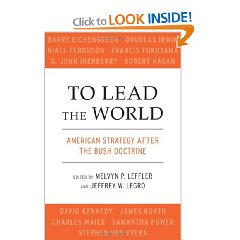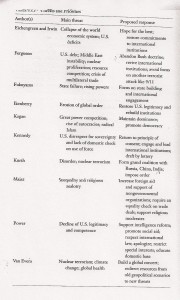
Melvyn Leffler and Jeffrey Legro
Of the three books I bought to explore this particular theme, this was the best by far and the only one to earn five stars. Twelve chapters, twelve authors, not a single runt in this litter. The notes are outstanding.
Although this book's contributors are out of touch with the results of the UN High-Level Panel on Threats, Challenges, and Change, whose report, A More Secure World: Our Shared Responsibility–Report of the Secretary-General's High-level Panel on Threats, Challenges and Change (also free online) is now the global standard for any serious strategist and every globally-oriented intelligence professional, what this group knows and share is valuable and I found this book totally absorbing over two nights of reading. They do not, however, have a grip on intelligence or how deeply we have hurt–and have been perceived to have hurt–the rest of the world.
Early on as I go through the book fast I am impressed by the balance between skepticism of the traditional thinking and spending habits (one size fits all heavy metal military) and a focus on the importance of having a broad capability that can respond to and impact on a diversity of threats most of which cannot be easily anticipated.
Some highlights, generally identifying the specific author
Stephen Van Evera–Balance of Power concerns have faded, focus now on three broad threats (weapons of mass destruction, terrorism, and global environmental & public health). Selective engagement required. Will be opposed by special interests, foreign lobbies, and US defense establishment. Six missions:
1) Military-intelligence offensive
2) Securing WMD
3) Homeland security
4) Waging a war of ideas
5) Ending inflammatory conflicts
6) Remediating failed states
QUOTE from Van Evera: “The U.S. public's ignorance of world affairs makes it susceptible to false claims from special interests who oppose a concert policy for self-serving reasons.” See Vice: Dick Cheney and the Hijacking of the American Presidency and They Dare to Speak Out: People and Institutions Confront Israel's Lobby among many others (access all my reviews in 98 categories at Phi Beta Iota the Public Intelligence Blog). This one quote is the focus on my personal championship of the new craft of intelligence, information operations, the smart nation act, and collective intelligence to create a prosperous world at peace (all titles of books I have published).
QUOTE Fareed Zakaria: “Having traveled the world and met with senior government officials in dozens of countries over the past year, I can report that with the exception of Britain and Israel, every country the administration has dealt with feels humiliated by it.” “The Arrogant Empire, Newsweek, 24 March 2003
Robert Kagan is a bit too neo-con for my taste, he sees radical Islamist to be hold-outs against modernization and simply does not compute US sins. Kagan is always provocative of reflection but in focusing on ideologies leaves everything else out including competing approaches to education. Kagan of course considers US predominance good and sustainable, pointing out we spend only 4% on defense today (but at what cost, I would ask). While Kagan gives lip service to supporting democracy I do not see him getting a grip on the fact that in the aftermath of 9/11 we not only sleep with the devil (Saudi Arabia, where 79% of its citizens hate us for supporting a despotic perverted spendthrift regime) but are frolicking with 42 of 44 dictators doing rendition and torture in return for funds that go straight to offshore bank accounts. See Sleeping with the Devil: How Washington Sold Our Soul for Saudi Crude and Breaking the Real Axis of Evil: How to Oust the World's Last Dictators by 2025.
Charles Maier's contribution, “Beyond Statecraft” is the absolute delight of this book. In the company of top people, he stands apart. US and West will continue to experience socio-economic and cultural blowback. US and West are facing broad popular mentalities and claims that are spilling over state boundaries (which are artificial, see my review of The Health of Nations: Society and Law beyond the State. Anticipates a devolution of states, farewell to Westphalia. “Foreign Policy” is no longer a sufficient concept, and “soft power” does not cut it in the absence of hard power. He does not use the term “Whole of Government” but the thoughtfulness of this essay and his mention of Dani Rodrik's “How to Save Globalization from Its Cheerleaders” has my rapt attention.
G. John Ikenberry: Liberal order building, a grand strategy of investments. US faces complex decentralized threats; this needs a different approach from Cold War (General Al Gray and I said this in 1989 in “Global Intelligence Challenges of the 1990's”); must recreate global architecture of collaborative institutions, restore U.S. authority and legitimacy; create a protective infrastructure, return to basics including the progressive social bargain, collective security, and a restoration of a public philosophy of doing good.
QUOTE G. John Ikenberry: “The most serious threat to U.S. national security today is not a specific enemy but the erosion of the institutional foundations of the global order…”
James Kurth I may not have understood, came across as oblivious to US sins, concerned about pushback from populism in Latin America (see SAVAGE CAPITALISM AND THE MYTH OF DEMOCRACY: Latin America in the Third Millennium) and Islam.
QUOTE Samantha Powers: “Although U.S. policy choices are within U.S. control, many of the other twenty-first century trends are not.” She joins others in being concerned about special interests preventing needed redirection and reconstruction.
David M. Kennedy is another chapter that resonated with me. He writes of how far we have wandered from our Founding Fathers and especially Thomas Paine, the Declaration, and our emphasis on the consent of the governed and anti-colonialism, offers up a paean to Wilson and the concept of hegemony by invitation. He articulates the dangers of military growing isolated from both the normal economy and the public while the public is also remote from foreign policy (all of the authors recognize the problem of the public's ignorance, to which I would respond with direction to both Will Durant's Philosophy and the Social Problem: The Annotated Edition and George Will's Statecraft as Soulcraft. He asserts and I agree that the Constitution is being violated on War Powers, but of course that is the lack of integrity between the two-party tyranny and the Members who choose to ignore Article 1. He observes, citing others, that out of 234 wars that the US has joined, only 5 have been approved by Congress–for that alone we should impeach every Member where they stand. There is a lot in this chapter–especially vital is the author's emphasis on devising policy that respects both the sovereignty of the US public and the sovereignty of others. See all the books under my Empire category at Phi Beta Iota.
Eichengreen and Irwin my eyes glazed over. It's just impossible for me to focus on anything that perpetuates the existing economic order that has looted most of the world and created long-term havoc for five billion people.
Fukiyama is pretentious, gives lip service to serving the poor, observes that US military power is a bad fit for failed states and that traditional realism does not work; slams Bush-Cheney for overstating GWOT and Al Qaeda, points out that Muslims do not like our behavior. See Policing the New World Disorder: Peace Operations and Public Security and Human Security and the UN: A Critical History (United Nations Intellectual History Project Series). He uses the term soft power without reference to Joe Nye, and end by calling for a restructuring of the US Government, and a restoration of the ability to listen and relearn. “Whole of Government” and “Rebalancing the Instruments of National Power” are not cited, but he's on that track.
Nial Ferguson is a third chapter that really resonates. He speaks of four deficits: financial, manpower, attention, and legitimacy, this is an excellent single chapter for student reading. He provides a superb discussion of how those who hate us the most are the citizens of our closest allies, and the fact that 79% of all Saudis hate us sticks with me. Citing the National Safety Council he points out that a US citizen has a 1 in 78 change of death by car, a 1 in 314 chance of death by gun, and a 1 in 267,716 chance of death by terrorist. He concludes that Bush and the preemption strategy have proven wrong, costly, unpopular and ultimate unjustifiable. He sees four big threats: 1) Middle East, 2) proliferation, 3) competition for raw materials and energy, and 4 breakdown of trade (no mention of piracy).
QUOTE Nial Ferguson: “The deficits of American power are structural, not merely the results of mistakes by one misguided administration.”
Leffler and Legro do a fine job of summing up the book, and I am over-all extremely impressed by the process by which the book was formed, to include Oxford having the book's publishing action officer at the event. This is a coherent adult piece of work that is joy to read, never mind that it misses two thirds of the spectrum, e.g. The Fifty-Year Wound: How America's Cold War Victory Has Shaped Our World; The Sorrows of Empire: Militarism, Secrecy, and the End of the Republic (The American Empire Project); and The Eagle's Shadow: Why America Fascinates and Infuriates the World.
Leffler and Legro sum up SHARED beliefs among the authors as:
1) Leadership by US needed
2) Preponderance of power is a good thing
3) Freedom is worth fighting for
4) Economic openness is important
5) Collaboration is helpful.
They cite Madeline Albright on the US as an indispensable nation, I do not agree at all. If the US does not get its act together and become a Smart Nation, China would be vastly better off by-passing us completely and restructuring to create low-cost solutions for the five billion poor.

Leffler and Legro sum up DISAGREEMENTS among the authors pertaining to
1) Future of the system
2) Ability of US to reform
3) US legitimacy in peril
4) Democracy as a fixed goal
5) Value of getting new institutions
Page 262 is a marvelous listing of threats by author that I am scanning in and will display at Phi Beta Iota. I refuse to add more images to Amazon since they destroyed all 350 of the ones I loaded in a lazy move to censor a single image of Bush and Obama sharing the same face (easily found in Graphics at Phi Beta Iota).
Other top level books I recommend (Amazon ignores my repeated suggesting that ten links are not enough in the non-fiction arena–at Phi Beta Iota ALL links are active and lead back to Amazon):
The Search for Security–A U.S. Grand Strategy for the Twenty-First Century
Preparing America's Foreign Policy for the 21st Century
Security Studies for the 21st Century
Truly a first class contribution across the board, a superb reader for any level from undergraduate to graduate to remediation of poorly-educated policy makers, acquisition managers, and operational commanders.




